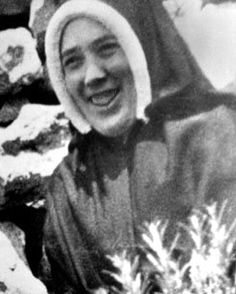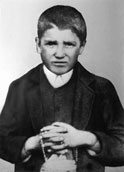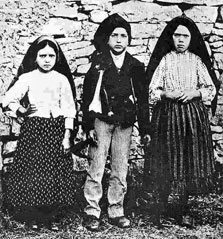
In May 1946, Sister Lucia, then a Dorothean nun, went to Fatima to visit the sites of the apparitions of the angel (1916) and Our Lady (1917). At Valinhos, where the fourth apparition of Our Lady took place, a group was waiting for her that including her uncle Marto, the father of Francisco and Jacinta. Seeing her, he happily exclaimed:
“What a beautiful young lady you’ve become!…Remember my Jacinta and my Francisco?…If they were alive, they would be like you!”
Lucia replied: “They would be like me?… They would be better than me! This time, Our Lord made an oversight. He should have left one of them here instead of me!…”1
Sister Lucia always showed great regard for the virtues of her cousins Francisco and Jacinta, who died on April 4, 1919 and February 20, 1920 respectively. Lucia followed them on February 13, 2005, when John Paul II had already beatified her cousins.![]()
FREE e-Book: A Spanish Mystic in Quito
In honor of the centennial of Blessed Francisco’s birth, just celebrated on June 11, 2008, it is fitting to devote an article to his virtues and the graces bestowed upon him by Our Lady.
A Seer Undeservedly Forgotten
Those who know the story of the Fatima apparitions are aware that Sister Lucia saw, heard and spoke with Our Lady; Jacinta saw and heard; Francisco saw but neither heard nor spoke.
Thus, Our Lady established a hierarchy among the visionaries, leading many to cast Francisco aside as the least-favored. This mistaken attitude ignores the fact that seeing Our Lady, in and of itself, is an extremely high privilege, one to which Francisco admirably corresponded.

Sacral Contemplation of God’s Works
In 1986, Fr. Fernando Leite, S.J. wrote a beautiful book about Blessed Francisco, in which he comments:
This small poetic soul [of Francisco], this kind-natured person, this sensible heart, this embryonic contemplative loved all things. He understood them as works of God, who after creating them looked at them with a pleased gaze and saw “they were all very good” (Gen. 1:31).2
There are numerous masters of Catholic doctrine who prove that contemplation of created things can elevate the soul to God, since each of them contains a reflection of the Divine Perfections.
Thus, for example, the seers referred to the stars as the angels’ candles, to the moon as Our Lady’s candle, and to the sun as Our Lord’s candle. In her Memoirs, Sister Lucia mentions this episode:
[Francisco] was going there with us to pray while we waited for Our Lady and the angels to light their candles…“No candle is as beautiful as Our Lord’s,” he would tell Jacinta, who liked more Our Lady’s, which she said, “was not hard on the eyes.”3
For this reason, Fr. Fernando Leite describes him in the following way:
Francisco appears to us as one of those interior, very sensitive souls of a contemplative mold who do not like commotion and appreciate thinking more than speaking.4
Similarly, when Francisco would accompany Lucia to school, he would often tell her to leave him to pray and console the “hidden Jesus” at a Church en route. He would only leave the Divine presence when Lucia would come to fetch him after school.
Mystical Graces of the Highest Order
Fr. Joaquin María Alonso of the Congregation of the Heart of Mary, who worked from 1966 until his death in December 1981 preparing the documents on Fatima, agrees with Father Leite’s description of the young man.
Father Alonso dedicates a special chapter to him, in his little known posthumous work, Doctrina y espiritualidad del mensaje de Fatima.5
In it, he opines that Francisco possessed a mystical perception of the highest level and that for this reason:
even the vision of Hell did not make such an impression on him, certainly because he contemplated the mystery of iniquity in the superior light of mystical contemplation.6
Fr. Alonso also explains that this mystical side of Francisco was only satiated by what the children used to call the “reflex,” a phenomenon whereby the visionaries would see themselves as if submerged in God. Sister Lucia further explains: “What most impressed or absorbed him [Francisco] was God, the Blessed Trinity, in that immense light that penetrated even into the most intimate recesses of our souls.”7
 Learn All About the Prophecies of Our Lady of Good Success About Our Times
Learn All About the Prophecies of Our Lady of Good Success About Our Times
Thus, Father Alonso concludes that Francisco possessed a first-class “mystical perception,” and even dares to state that his visions were “mystically more perfect” than those of the other seers.
True or not, Father Alonso’s conclusion indicates that Francisco was not a lackluster participant in the Fatima events but a protagonist with his own special perspective.
Francisco’s Priority: to Console Our Lord
The priest also observes that Francisco’s unique spirituality made him more concerned with consoling Our Lord than converting sinners. Thus, he was a great promoter of reparation. This conversation that Sister Lucia narrates in her memoirs, illustrates Francisco’s desires:
One day I asked him: “Francisco, which do you like best: to console Our Lord or to convert sinners so as to prevent souls from going to Hell?”
“I liked more to console Our Lord. Didn’t you notice last month how Our Lady was so sad when She said people must no longer offend God Our Lord, who is already much offended? I wanted to console Our Lord and, afterward, to convert sinners so they will no longer offend Him.”8
The priority of consoling God was so clear in his mind that he would make it explicit quite often. Sister Lucia tells one day when she was visiting Francisco, already in his final sickness, he was complaining about a massive headache. When Jacinta reminded him to offer it up for the conversion of sinners, he replied: “Yes, but first I offer it to console Our Lord and Our Lady; and only then I offer it for sinners and for the Holy Father.”9
Learn All About Sr. Mariana de Jesus Torres
This intention was very clearly on his mind until the moment of his death. He even went so far as to express fear that when he arrived in Heaven, he would be so eager to console Our Lord, that he would forget to pray for the conversion of sinners.
Hence, Father Alonso concludes:
Francisco’s contribution to the Message of Fatima is not mainly in the order of apologetics. …Its importance comes from the ineffable desire for God’s consolation, from the absolutely original character of his ‘theocentric’ spirituality, that is, aimed first and above all at restoring to God the glory lost by sin and only afterward at the salvation of souls.10
The Church teaches that saints are special intercessors to obtain graces related with their spiritual school. Thus, the faithful should ask Blessed Francisco of Fatima to acquire a participation in his desire to console Our Lord and Our Lady, by valiantly accepting all the sufferings derived from opposing today’s world, which proudly rebels against all of God’s Commandments.

Footnotes
- Sebastião Martins dos Reis, A vidente de Fátima dialoga e responde pelas aparições, (Editorial Franciscana, Braga, 1970) p. 123.
- IV Memoirs, p. 248 . (Our quotes from Memórias da Irma Lucia are taken from the facsimile edition by Fr. Antonio Maria Martins, S.J.).
- IV Memoirs, p. 248 . (Our quotes from Memórias da Irma Lucia are taken from the facsimile edition by Fr. Antonio Maria Martins S.J.). Ibid., p. 21.
- Ibid., p. 21.
- Doctrina y espiritualidad del mensaje de Fatima (Arias Montano: Madrid, 1990).
- Ibid., p. 122.
- IV Memoirs, p. 266.
- Ibid., pp. 284-286.
- Ibid. p. 288.
- Ibid. pp. 128-129.

